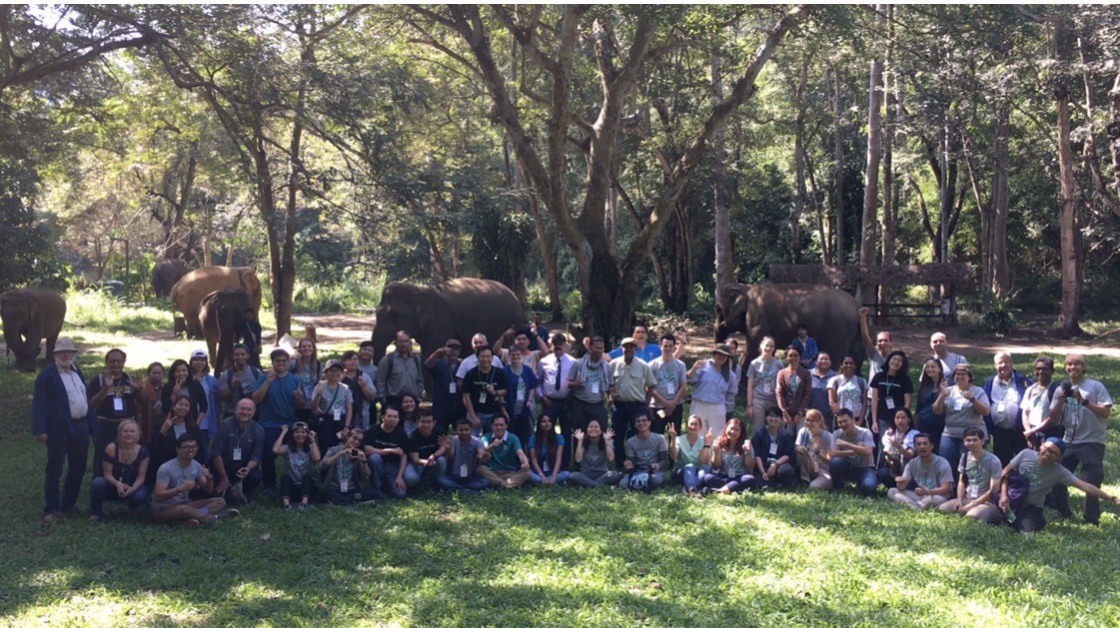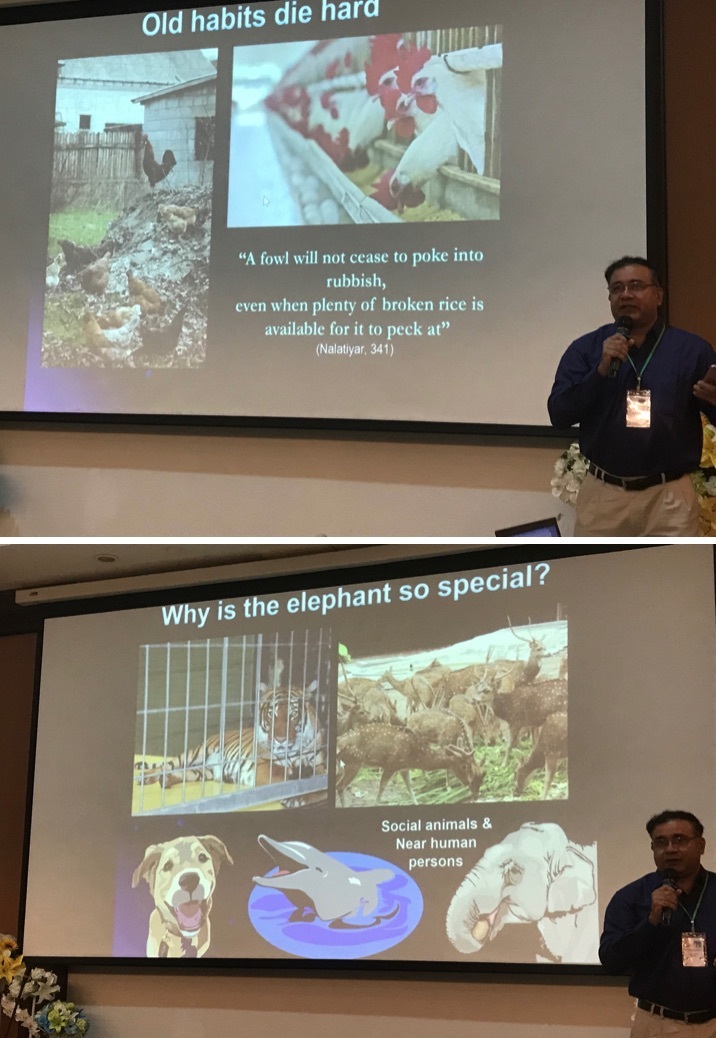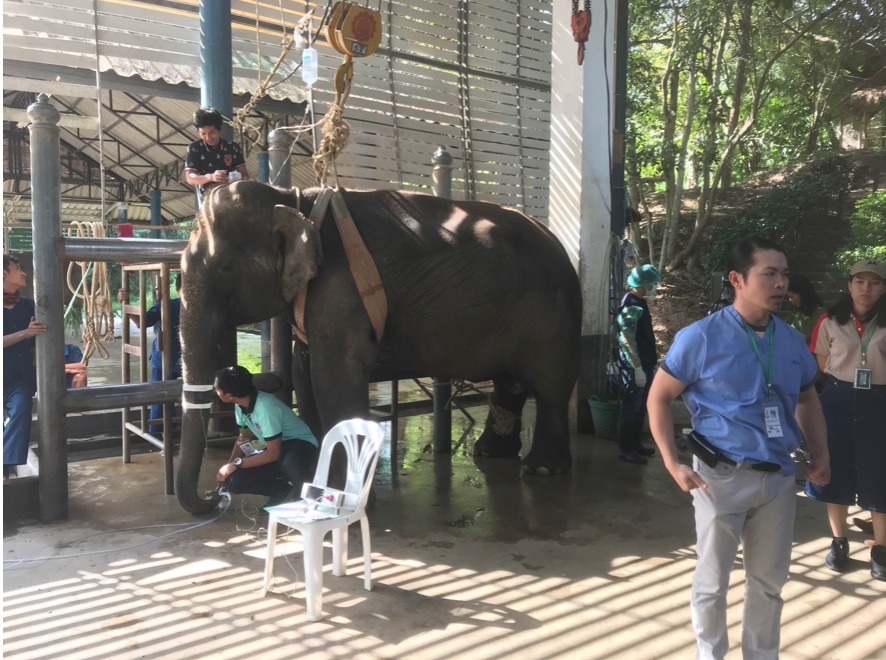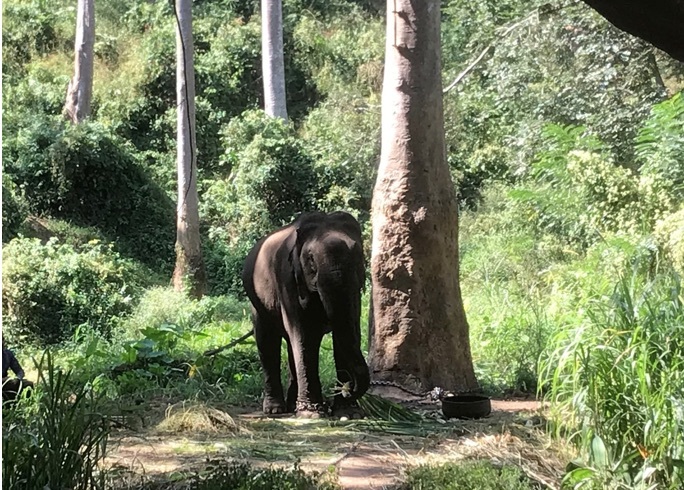
ASIAN ELEPHANT WELFARE CONFERENCE
28th – 30th November, 2018 Lampang, Thailand
I arrived at the National Elephant Institute, in Lampang, in time for the opening ceremony of the Asian Elephant Welfare Conference. This was a dual effort of both the Copenhagen Zoo and the (Thai) National Elephant Institute.

The National Elephant Institute, Lampang, Thailand.
We began the conference itself with the presentation entitled: Captive elephant welfare - An overview by Bjarne Clausen, Denmark. Bjarne has been an extraordinary support for HELP and the work we do. Bjarne’s underlying theme was underscored by his quotation “when man takes animals into his service, it is his duty to treat them well”. Following Bjarne’s presentation, I gave an overview of the work done by Human Elephant Learning Programs (HELP). I was very aware that the concept of conflict theory is not understood by most people, even behaviourists, and seems difficult to grasp. The more you have worked with elephants, the more you are drawn into the traditional paradigm of thinking. So I emphasised that the behaviour problems that are seen are frequently symptoms of dysfunctions in the use of negative reinforcement. And further, that our remit is not to do away with the negative reinforcement but to teach people around the world to do it better, so that SIGNALS are consistent, clear and that they shrink to light versions of the tactile pressure and voice commands.
Following my presentation, my old friend and supporter from The Wildlife Trust of India, Dr Ashraf Naduvilvappil gave a presentation on “Compromised welfare and measures to address it”.

Dr Ashraf and his address on compromised welfare
Dr Ashraf confirmed the uptake of HELP’s work throughout India and the struggle to change old ways.
Almost all of the presentations addressed at this conference approached the topic of animal welfare entirely from the veterinary perspective. Other topics presented included Elephant Endotheliotropic Herpes Virus by Kathryn Perrin of Denmark, Bull management and control by Kushal Konwar Sarma of India, Translocation and transportation initiatives by Zaw Min Oo, from Myanmar and Contingency plans for elephant related emergencies-public and health by N. S. Manoharan of India and Chandana Rajapaksa of Sri Lanka.
In the afternoon we formed groups to discuss welfare impacts of the above topics within the framework of “The Five Freedoms”. In fact The Five Freedoms concept was central to this entire conference and can understand that because of the importance within the concept of avoiding pain, poor nutrition etc however I think the conference would have been more up-to-date had it focused on more recent model of David Mellor’s “The Five Domains” which is not only focuses on the negative aspects of poor welfare in nutrition, environment, physical health and behaviour but also includes the signs of positive welfare in these areas and furthermore this model shows that the insults to these domains all impact on an animal’s mental health, and this is of vital importance.
Encouraging signs in the presentations of a few delegates suggesting the importance of socialisation and greater freedom to move.
The next day further presentations were again from the veterinary perspective and included Pain relief of sick and injured individuals by Carsten Grøndahl of Denmark and Christopher Stremme of Indonesia and Sedative immobilization of elephants by Vijitha Perera of Sri Lanka and Khajohnpat Boonprasert of Thailand. Following these presentations, Nepal’s chief elephant vet, Dr Kamal Gairhe and Prasop Tipprasert (another of HELP’s big supporters) of Laos spoke about Restraint procedures for sick and injured elephants.
In mid-morning, we took a shuttle bus to the Elephant Hospital in Lampang. There we had presentations on endoscopic diagnosis, medical management including life support, immobilisation of elephants, dealing with osteoarthritis in geriatric elephants, and nutritional management.
In the afternoon we went back to the conference venue and discussed within the group setting topics such as pain relief, sedative and mobilisation and restraint procedures from the viewpoint of The Five Freedoms.

An elephant restrained for treatment at the hospital
The following day, we took a field trip to the Phang-Lha Elephant Rehabilitation Center, a place for very old elephants and very dangerous elephants: elephants that had killed people. These elephants were chained and heavily monitored by their mahouts who at least had a bond with the elephants and were with them almost all of the day night. At this centre there was also display of the various locally grown herbal medicines used to cure various diseases and behaviour problems. There was also talk on the management of musth in bull elephants by Petthisak Sombatputorn, as well as a presentation on the approaches to pain management of terminally ill individuals and the care of geriatric elephants.

An old bull elephant that had killed 3 people
In the afternoon we had another group discussion where we broke into several groups. I led the discussion with one group where we focussed on stereotypic and frustration behaviours in captive elephants.
Group discussion on stereotypies and frustration behaviours
At the end of the day certificates were handed out to all delegates and finally we departed for our hotel and ultimately travelling home to our various countries.
Our final group photo at the rehab centre with some geriatric elephants in the background
After the conference, I had a very productive discussion with Nina Brask, (HELP’s most valuable supporter from the Danish Welfare Society) Michael Vogler and Dr Will Thomas (both from the Mandalao Elephant Conservation centre in Laos where we have worked in the last couple of years). This discussion centred on the dire need at these elephant welfare conferences to focus on behaviour training, including the myriad desensitisation techniques that we have been using for many years with great success and without the need for physical restraint. In general, throughout Asia we need a much broader, safer and more up-to-date approach to the way elephants are trained and handled 24-hours per day.
Michael Vogler offered to take a big leap in this direction by suggesting that the Mandalao Elephant Conservation Centre to host the next elephant welfare conference in November, 2019. From my point of view, it would be most educational to have I balance of both veterinary and behaviour management aspects from the framework of The Five Domains. I believe that this approach will provide a greater guarantee for the safety and welfare of the captive elephants that constitute a significant percentage of the Asian Elephant population.
I would very much like to thank all our donors including the Danish Animal Welfare Society for enabling need to attend this conference. Because we now have not only our clear sights set on the next elephant welfare conference in Laos, but we will have more progressive agenda there that will undoubtedly accelerate improved elephant welfare throughout Asia.